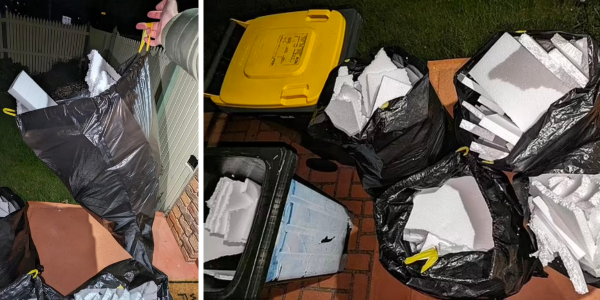Homewares company faces huge backlash with their 'unnecessary' packaging
By
VanessaC
- Replies 12
Many can save a lot of money by shopping for great products at discounted prices online.
But when it comes to online shopping, there may be an unforeseen cost—such as the huge amounts of packaging that comes with the purchased items.
It’s a sad reality that the packaging materials retailers use can be excessive. And considering that most of these materials are non-biodegradable, it also impacts the environment.
This is why it came as no surprise that one of Australia’s biggest online homewares retailers, Temple & Webster, faced a huge backlash recently over their ‘unnecessary’ packaging practices.
The backlash came after a Hobart woman shared her experience of receiving a single bed frame from the retailer, along with photos of bin liners and a rubbish bin filled with the foam.
'This is the amount of styrofoam used in packing for one bed frame from Temple & Webster,' the woman wrote.
'It's enough to fill 4 large bin liners and half of the outdoor bin. Completely unnecessary.'
'The lack of consideration of this fact enrages me. Australian companies need to do better.'
The retailer claimed on their website that it collaborated with 'sustainability experts' to include 'more recycled content in our packing' and to make their packaging ‘recyclable or reusable', however, the website reportedly did not mention its use of styrofoam in its packaging.
The woman also claimed that 'styrofoam takes 500 years to decompose', which the Society for Environmental Journalists' website confirmed, while other estimates put it way beyond 500 years.
One estimate even put it at a million years before breaking down, depending on the condition of the environment the styrofoam is in.
The woman’s post garnered varying responses, with some agreeing with her, saying: 'I agree that it would be better if it wasn’t used at all. I recently bought a product with all paper packaging, even the screws were in little paper bags.'
While some defended the retailer.
'If your bed frame arrived all banged up, you'd be on here whinging about that,' one replied.
'Flat-packed furniture shipped around the world and delivered to your door needs protection otherwise, it would arrive damaged. It is necessary,' another added.
'Do you honestly think a company would spend the time and money putting styrofoam in for no reason?' A third commented.
One shared that there are recycling centres that specialise in polystyrene, but the customer would have to deliver it to their drop-off points.
Other users suggested to always shop with the environment in mind.
'The alternative is to not buy mass-produced, imported furniture,' one suggested.
While another recommended reusing second-hand furniture, saying: 'Second-hand is the affordable option, and even better for the environment.'
However, the same user acknowledged that despite the abundant amount of options, 'it takes more effort and people prefer the convenience'.
While a third suggested: '[Go to] Gumtree or council cleanups in rich suburbs.'
 Members, have you received an item you’ve shopped for online in similar 'unnecessary' packaging? Let us know in the comments below!
Members, have you received an item you’ve shopped for online in similar 'unnecessary' packaging? Let us know in the comments below!
But when it comes to online shopping, there may be an unforeseen cost—such as the huge amounts of packaging that comes with the purchased items.
It’s a sad reality that the packaging materials retailers use can be excessive. And considering that most of these materials are non-biodegradable, it also impacts the environment.
This is why it came as no surprise that one of Australia’s biggest online homewares retailers, Temple & Webster, faced a huge backlash recently over their ‘unnecessary’ packaging practices.
The backlash came after a Hobart woman shared her experience of receiving a single bed frame from the retailer, along with photos of bin liners and a rubbish bin filled with the foam.
'This is the amount of styrofoam used in packing for one bed frame from Temple & Webster,' the woman wrote.
'It's enough to fill 4 large bin liners and half of the outdoor bin. Completely unnecessary.'
'The lack of consideration of this fact enrages me. Australian companies need to do better.'
The retailer claimed on their website that it collaborated with 'sustainability experts' to include 'more recycled content in our packing' and to make their packaging ‘recyclable or reusable', however, the website reportedly did not mention its use of styrofoam in its packaging.
The woman also claimed that 'styrofoam takes 500 years to decompose', which the Society for Environmental Journalists' website confirmed, while other estimates put it way beyond 500 years.
One estimate even put it at a million years before breaking down, depending on the condition of the environment the styrofoam is in.
The woman’s post garnered varying responses, with some agreeing with her, saying: 'I agree that it would be better if it wasn’t used at all. I recently bought a product with all paper packaging, even the screws were in little paper bags.'
While some defended the retailer.
'If your bed frame arrived all banged up, you'd be on here whinging about that,' one replied.
'Flat-packed furniture shipped around the world and delivered to your door needs protection otherwise, it would arrive damaged. It is necessary,' another added.
'Do you honestly think a company would spend the time and money putting styrofoam in for no reason?' A third commented.
One shared that there are recycling centres that specialise in polystyrene, but the customer would have to deliver it to their drop-off points.
Other users suggested to always shop with the environment in mind.
'The alternative is to not buy mass-produced, imported furniture,' one suggested.
While another recommended reusing second-hand furniture, saying: 'Second-hand is the affordable option, and even better for the environment.'
However, the same user acknowledged that despite the abundant amount of options, 'it takes more effort and people prefer the convenience'.
While a third suggested: '[Go to] Gumtree or council cleanups in rich suburbs.'
Key Takeaways
- An Australian homewares retailer, Temple & Webster, has been criticised for using an excessive amount of polystyrene foam to pack a bed frame.
- A Hobart woman needed five bins to dispose of the packing foam from her furniture delivery, which she claimed was completely unnecessary.
- Her post generated various responses, with some defending the retailer and others suggesting alternatives to polystyrene.
- Although Temple & Webster claimed to have collaborated with sustainability experts to make its packaging recyclable or reusable and include more recycled content, the company reportedly makes no mention of its use of styrofoam on its website.








